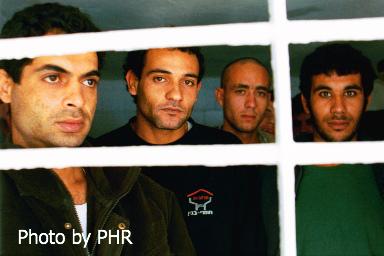Supreme Court Upholds Travel Ban on Sheikh Ra'ed Salah
On 17 July 2002, the Supreme Court dismissed a petition filed by Adalah on behalf of Sheikh Ra'ed Salah, the leader of the Islamic Movement in Israel; Al Meezan Association for Human Rights; and in its own name against the Minister of Interior, Eliyahu Yishai. The petitioners asked that the Court declare the Minister's order of 16 February 2002, prohibiting Sheikh Ra'ed Salah from traveling outside the country for a period of six months, unconstitutional and void.
Today, Sheikh Ra'ed Salah testified before the Official Commission of Inquiry into the October 2000 Events, in response to the warning issued against him by the Commission.
On 17 July 2002, the Supreme Court dismissed a petition filed by Adalah on behalf of Sheikh Ra'ed Salah, the leader of the Islamic Movement in Israel; Al Meezan Association for Human Rights; and in its own name against the Minister of Interior, Eliyahu Yishai. The petitioners asked that the Court declare the Minister's order of 16 February 2002, prohibiting Sheikh Ra'ed Salah from traveling outside the country for a period of six months, unconstitutional and void.
At the first hearing on the case, on 10 June 2002, the three-judge panel composed of Justices Yakov Tirkel, Ayala Procaccia and Edmond E. Levy denied Adalah's request for an immediate injunction to allow Sheikh Ra'ed Salah to travel to Saudi Arabia to complete al-Umra pilgrimage. After considering secret evidence provided by the General Security Services (GSS), the Justices instructed Adalah to submit an appeal to the Minister of Interior stating their objections to the order restricting Sheikh Ra'ed Salah's travel abroad. Adalah complied with this instruction, and the appeal was rejected by the Minister of Interior on 20 June 2002.
In the decision, Justice Tirkel ruled that the restriction on Sheikh Ra'ed Salah's movement "is not among the gravest of infringements of liberty or freedom of movement," nor is the six-month time period for which the restriction was imposed "impossible to withstand." Justice Tirkel noted that preventing an individual from leaving the country in order to perform a religious pilgrimage is an extremely grave violation of the freedom of religion. Nevertheless, he stated that since it is not necessary to perform al-Umra pilgrimage at a particular time of the year, Sheikh Ra'ed Salah would be able to perform the pilgrimage following the expiration of the movement restriction against him.
In rejecting Adalah's petition, Justice Tirkel applied the "frank and earnest fear" test, specified in Article 6 of the Emergency Regulations (Foreign Travel) (1948) and first referred to by the Court in HCJ 111/53, Kaufman v. Minister of the Interior. According to this test, "a basis for the fear that [the individual's] leaving is liable to harm state security" is sufficient to limit that individual's freedom to leave the country. Justice Tirkel concluded that, after considering the secret evidence presented by the GSS and the Ministry of Interior, he was convinced that there was a "frank and earnest fear," and even a "virtual certainty" that Sheikh Ra'ed Salah could "gravely endanger" state security if he were to leave the country. Justice Tirkel applied the "frank and earnest fear" test despite, as he noted, the increased importance assigned to the individual's freedom of movement by the passage of the Basic Law: Human Dignity and Liberty (1992), which followed the Court's first application of the "frank and earnest fear" test.
Further, Justice Tirkel ruled that Sheikh Ra'ed Salah's right to a fair hearing had been "thoroughly exercised," though this hearing took place only in writing, and only after the restriction order had been issued against him.
In Adalah's view, the Court's ruling contradicts basic constitutional rights to freedom of movement and freedom of religion, upheld by the Basic Law: Human Dignity and Liberty and international human rights law. The "hearing" afforded to Sheikh Ra'ed Salah was insufficient to fulfill his right to be fairly heard. At no time has he had the opportunity to examine or challenge the secret evidence that formed the basis of the Minister's and the Court's decision to restrict his movement. Further, the Minister's decision is sweeping and overbroad, as it prevents Sheikh Ra'ed Salah from leaving the state to travel to any place, for any purpose, and for any length of time. Adalah views the decision to violate Sheikh Ra'ed's constitutional right to freedom of movement as being without legal basis, and argues that if the state has evidence of criminal intent on the part of Sheikh Ra'ed Salah, it should file an indictment accordingly.














